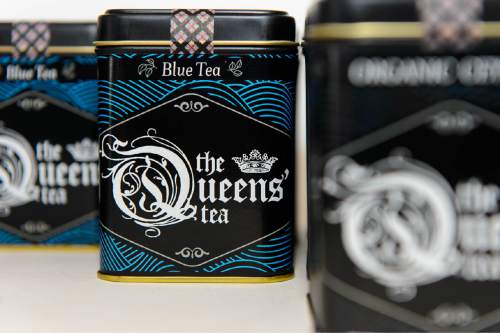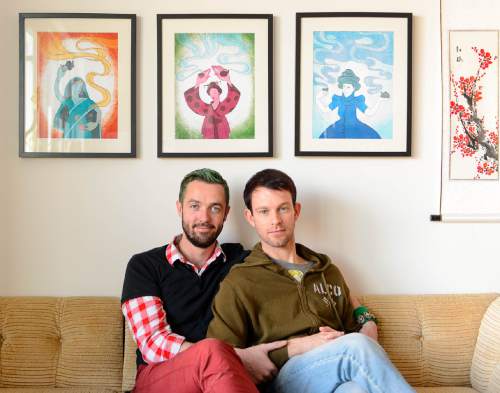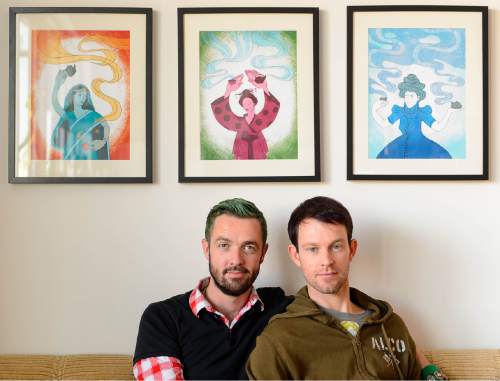This is an archived article that was published on sltrib.com in 2015, and information in the article may be outdated. It is provided only for personal research purposes and may not be reprinted.
The owners of The Queens' Tea, a 2-year-old Salt Lake City company, say they must close their commercial kitchen and discontinue their online business to cover legal fees after a Seattle company with a similar name filed a trademark infringement lawsuit against them.
"To ship products interstate, you must have a commercial kitchen. And right now we are short on funds, with money going to lawyers, so we have to close our kitchen," Seth Anderson, co-owner of The Queens' Tea, said Tuesday.
Beginning Feb. 1, the company will no longer be filling customer orders by mail. It will continue to sell its loose-leaf tea blends at local farmers markets and stores in Salt Lake City.
Anderson and Michael Ferguson started their company in 2012 as a side job while attending school. Both are now working on graduate degrees at the University of Utah. They were the first same-sex couple to marry in December 2013 when a federal court struck down the state's gay marriage ban; they say the word "queens" in their business name refers to the slang term for a gay man and has nothing to do with British royalty.
Still, the Salt Lake company is being asked to stop using the title because it is a "willful trademark infringement" and creates "unfair competition" for Seattle's Queen Mary Tea Room, according to the suit filed in U.S. District Court for the Western District of Washington.
In the complaint, the Queen Mary Tea Room, open since 1988, says it is well known among tea enthusiasts, is "the oldest independent tea room in America" and has been featured in the book "The Great Tea Rooms of America." Besides restaurant services, it has a wholesale tea business and sells many tea accessories, from pots and cups to aprons and gifts.
According to the website, the company also offers people a chance to work as independent sales consultants — called Tea Queens — hosting parties in homes for free gifts, points and discounts.
In the lawsuit, the Queen Mary Tea Room owners contend The Queens' Tea actions have "damaged, and will continue to damage" their reputation and "may discourage current and potential customers from dealing" with them. The company was specifically upset about The Queens' Tea selling a T-shirt this summer with the words "Tea Queen." The shirts were made as a fundraiser for homeless youth in Utah, many of whom identify as LGBT.
"We made no money on the sale of the shirts and when Queen Mary sent us a letter that they had a federal trademark for the words 'tea queen' — although they don't have rights to that on clothing — we removed them from the website," Anderson told The Tribune. "A federal lawsuit over the sale of less than 60 T-shirts seems absurd to me."
The Seattle company had contacted The Queens' Tea even before that, said Anderson. "They wanted us to change our name and pay them $15,000."
Attorneys for Queen Mary Tea Room could not be reached for comment.
The Queens' Tea has filed a motion to dismiss the Queen Mary Tea Room complaint and expects a ruling in this case to be delivered in a few months.
"We hope the judge in the case will agree with us that the Queen Mary Tea Room and Restaurant in Seattle has overreached in their claims to exclusive use of the words 'Queen' and 'Tea' under trademark law," the owners said. "In a fair and open market system, where entrepreneurship is a virtue, we find it regrettable for businesses to resort to tactics such as these."
Anderson and Ferguson said that continuing with the lawsuit has hurt their young business. "The assets that would be invested into developing our company and serving our customers have been drawn into attorney fees to defend ourselves against the Queen Mary Tea Room and Restaurant," they said.
Still, they are not ones to back down in a fight.
"Having both grown up in situations where we were repeatedly bullied for being true to ourselves as queer individuals, our principles compel us to stand up against unfair aggravated attacks," they said in the news release.
This the second lawsuit Ferguson has been involved in. He is one of four gay men to file suit against those who perform "conversion therapy," the controversial treatment intended to change a person's sexual orientation from gay to straight. The men are suing under New Jersey's Consumer Fraud Act, which protects people from deceptive, false or fraudulent business practices. That trial will begin in April, he said.
It's also not the first time a Utah food company has been sued over trademark infringement.
In 2010, Tami Cromar, the owner of Ruby Snap cookie bakery, received a "cease and desist" order from General Mills telling her to stop using the name My Dough Girl for her Salt Lake City business.
The national company, which owns Pillsbury, said the name was too similar to its iconic Dough Boy character and represented trademark infringement. Rather than fight, Cromar complied with the request.







